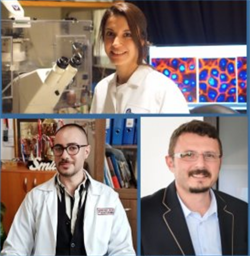List All News ArticlesHayrettin Ozan Gülcan, a faculty member of EMU Faculty of Pharmacy, has been involved in a scientific research study based on an alternative treatment of COVID-19
Published Date: Thursday, 20 August 2020

Assoc. Prof. Dr. Hayrettin Ozan Gülcan (bottom right)
Assoc. Prof. Dr. Kerem Teralı (bottom left)
Dr. Buket Baddal (top)
Hayrettin Ozan Gülcan, a faculty member of EMU Faculty of Pharmacy, has been involved in a scientific research study based on an alternative treatment of COVID-19
The last six months have witnessed one of the greatest worldwide efforts to find out solutions for the treatment COVID-19 pandemic. At one hand, scientists focus on the basic symptoms of the coronavirus infections. On the other hand, the virus has been taken under investigation to clearly understand how it is attached to target cells and how it displays its toxic activities through various pathophysiological cascades. Considering the time required to both generate original vaccination therapies and discover and develop small molecule class drug candidates, it is very logical to try to employ the already present drugs for a possible cure, as it is referred to as the repositioning of drugs, to save time and to obtain efficient therapies in such pandemics.
Viruses possess quite different structural organizations. In order to conduct replication process they need host cells. From this perspective, recent studies pointed out the significance of Angiotensin converting enzyme 2 (ACE-2) as the main receptor, present in the membrane of the host cells, that coronavirus attaches and uses as the key to enter inside the cell.
In the last period, Assoc. Prof. Dr. H. Ozan Gülcan, a faculty member of Faculty of Pharmacy Eastern Mediterranean University, has been involved in a scientific research study related to the finding of alternative treatments for the coronavirus infections. The study was collaborated with two research scientists who are Assoc. Prof. Dr. Kerem Teralı and Dr. Buket Baddal from Near East University. Dr. Gülcan has come up with the idea in which ACE-2 can be employed as a target to prevent virus cell interaction and upcoming virus penetration inside the cell. The study first employed the structural organization of ACE-2 and possible drugs that possess metal-chelating properties considering the fact that ACE-2 is a metalloprotein (i.e., zinc bound).
Initial in-silico docking studies (computer aided methodologies) performed by Dr. Teralı indicated the significance of the idea resulting in reasonable interaction results with fluoroquinolone antibiotics and some antimalarial drugs. The study was then extrapolated to more than seven thousand molecules to find out the best scores. The results pointed out 8 promising molecules showing high affinity to interact with the enzyme to prevent possible host-virus interactions. These molecules were classified as repositionable for the treatment of COVID-19 infections.
The study, entitled 'Prioritizing potential ACE2 inhibitors in the COVID-19 pandemic: Insights from a molecular mechanics-assisted structure-based virtual screening experiment', is published in Journal of Molecular Graphics and Modelling and it is freely accessible either in the journal web site or in pubmed at the https://pubmed.ncbi.nlm.nih.gov/32739642 link.